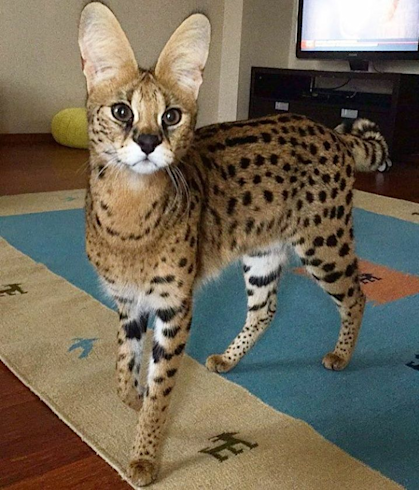Last Updated on November 16, 2023 by Fumipets
Serval Cats
Usually, it’s the large ears that catch your eye first. They force you to pause mid-scroll when you see a picture of a young exotic cat with big ears perched over their adorable face and covered in spots. You may be wondering, “What is this cute creature, and can I keep one as a pet?”
Serval cats are a wild feline species indigenous to Africa they represented by those ears and that face. Many servals are produced and sold in the pet industry as a result of the global fixation with discovering newer and more unusual creatures to keep as pets. But are serval cats suitable as pets? A serval cat does not make a suitable companion since, despite their domestication, they will always have a feral nature.
Due to a number of factors that will be discussed in this post, we do not recommend keeping serval cats as pets.
Serval Cats: An Overview
Servals are medium-sized wild cats that may be found across much of the African continent. They are the fastest, most athletic, and greatest hunters of all wild cat species because of their long legs. Serval cats are lonely, widely dispersed creatures. They consume a broad range of prey, such as fish, birds, and rodents.
Serval cats have a 40-pound weight limit and a 20-year lifespan. They have a healthy captive breeding population and are not threatened in the wild.
Why Serval Cats Are Unsuitable as Pets
Serval cats are wild creatures, which is the main reason they don’t make ideal pets. Unlike serval cats, domesticated cats have had thousands of years to modify their behavior to coexisting with people.
Serval cats are capable of becoming domesticated to a certain extent, particularly if they have been around humans since they were kittens, but they will always retain their wild instincts. Those untamed impulses are what make caring for a serval cat as a pet challenging and even dangerous.

Serval Cats Can Run Away
It takes a lot of work to house a serval cat properly and securely. They are strong, athletic creatures with the ability to leap high and dig deep. They are used to wandering freely on the African plains. Serval cats kept as pets need a large outdoor habitat that is completely contained by a strong fence, including the top, and has several feet of buried fencing to prevent any escape tunnels.
A water supply, plenty of trees, grasses, and other habitat-enriching elements are required in the enclosure. Serval cats need a warm habitat all year round since they can’t handle the cold.
Because serval cats are most active at night, keeping one in insufficient confinement might lead to a deadly nighttime escape. Domestic pets are put in danger by escaped serval cats, who also run the risk of being killed by vehicles or shot.
Serval Cats Are Bad House Guests
You could be thinking that there won’t be an issue since I’ll simply let my serval cat live inside and I won’t have to worry about them escaping. Well, not quite yet. Serval cats are difficult to maintain inside as well.
Serval cats may weigh up to 40 pounds at maturity. And that’s not a couch potato who weighs 40 pounds either. These cats are quick, athletic, energetic, and may be quite destructive in a domestic setting. Serval cats play aggressively, but they aren’t purposely destructive, therefore your home and possessions will suffer as a result.
You must take extra care to keep a serval cat’s habitat secure if you attempt to maintain one within your home. Serval cats that are curious often hurt themselves by ingesting household goods or tearing electrical cables.
Even if you take precautions to make your home secure, litter training is still a significant obstacle to getting through when attempting to keep a serval cat inside.
Serval Cats Can’t Be Reliably Litter Trained
A wild serval cat’s natural inclination is to mark its territory. In spite of your best efforts, a pet serval’s untamed instincts will ultimately prevail. Even though cats may utilize the litter box, they may still urinate outside the box.
Serval cats mark whatever they wish to claim as their own, including their humans, in addition to their territory. The fact that pet serval cats urinate on everything, which is clearly not a desired characteristic in a home pet, is one of the main reasons people end up getting rid of them.
Serval Cats Could Be Dangerous
A serval cat may connect with a human, although they are often solitary creatures. Although they may be loving and are often not violent toward people, keeping one as a pet is still dangerous.
Serval cats play rough and tumble, as we’ve previously established. Serval cats have the ability to inflict terrible injury to their human playmate, even if they are only biting or scratching as a play action.
Serval cats shouldn’t be kept around children or other animals, either. Of all the wild cat species, these cats are the best hunters. Even in a serval reared with people, those hunting instincts never disappear. Little animals and small humans seem and behave too much like prey to ever feel secure in the presence of a serval cat.

Other Complications to Keeping a Pet Serval Cat
Only one-third of US states permit the housing of serval cats since they are wild animals and cannot be lawfully kept as pets anywhere. Even if you can legally keep one, various states and towns have different laws, and you could need a permission. Obtaining a permit may be costly and difficult, and you often have to permit an examination of your serval cat’s cage to make sure it is safe.
It might also be difficult to maintain a serval cat’s health. Because their nutrition is so diverse in the wild, it is difficult to duplicate it, and as a result, many domesticated serval cats are underweight. Finding a vet experienced in caring for several cats may also be challenging.
Serval cats live longer than the typical cat or dog. A pet should not be committed for more than twenty years, particularly if they have a tendency to urinate on you. Additionally, you can’t simply abandon your pet serval cat at your neighborhood animal shelter if you discover that you can’t keep them any longer. Most likely, you’ll need to look for a specialized large cat rescue or sanctuary.
Conclusion
Wild animals should not be kept in your lawn or living room; they belong there. Remember that all infants grow up, and adult serval cats don’t make excellent pets if the adorable photo of a baby serval cat tempts you to do so. Numerous domestic cats in shelters and rescues across the globe are in need of permanent homes. Consider getting one of these cats instead of a serval cat, and leave the servals to the wild and your social media page!


















